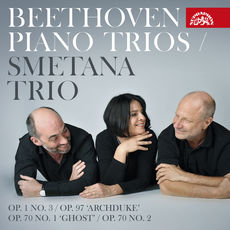
Musique illimitée
Écoutez cet album en haute-qualité dès maintenant dans nos applications
Démarrer ma période d'essai et lancer l'écoute de cet albumProfitez de cet album sur les apps Qobuz grâce à votre abonnement
SouscrireProfitez de cet album sur les apps Qobuz grâce à votre abonnement
Téléchargement digital
Téléchargez cet album dans la qualité de votre choix
Langue disponible : anglais
When Beethoven assigned the opus number one to his three piano trios, it was evident that the then 22-year-old composer would explore, advance and co-create the composition rules, and that he would very nearly transcend that which was comprehensible to his contemporaries. Upon hearing the first private performance of Op. 1, Joseph Haydn purportedly voiced his doubts as to whether the ordinary listener would be able to understand No. 3. Beethoven experimented with this combination of instruments too - with the form, harmonies and other facets.
The Piano Trio in D major, Op. 70 No. 1 may have had its roots in sketches for an opera based on Shakespeare's drama Macbeth that Beethoven was contemplating at the time. The spectral music of the slow movement, featuring strange modulations and said to be a reworking of the "Witches Chorus" intended for the opera, earned the piece the nickname "Ghost Trio".
In the Archduke Trio, Op. 97, Beethoven emancipated all the instruments, providing each equal scope to apply their technical qualities and possibilities of expression. Its first performance, in April 1814, was the penultimate public concert Beethoven, at the time almost deaf, gave as a pianist. The 250th anniversary of one of the greatest composers of all time was an irresistible impulse for the Smetana Trio. Their new addition to the Beethoven discography possesses all the parameters of the ensemble's previous, highly acclaimed recordings and will undoubtedly cause quite a stir. © Supraphon
Vous êtes actuellement en train d’écouter des extraits.
Écoutez plus de 100 millions de titres avec votre abonnement illimité.
Écoutez cette playlist et plus de 100 millions de titres avec votre abonnement illimité.
À partir de CHF 14,99/mois

Ludwig van Beethoven, Composer - Smetana Trio, Orchestra, MainArtist
2020 Supraphon A.s. 2020 Supraphon A.s.
Ludwig van Beethoven, Composer - Smetana Trio, Orchestra, MainArtist
2020 Supraphon A.s. 2020 Supraphon A.s.
Ludwig van Beethoven, Composer - Smetana Trio, Orchestra, MainArtist
2020 Supraphon A.s. 2020 Supraphon A.s.
Ludwig van Beethoven, Composer - Smetana Trio, Orchestra, MainArtist
2020 Supraphon A.s. 2020 Supraphon A.s.
Ludwig van Beethoven, Composer - Smetana Trio, Orchestra, MainArtist
2020 Supraphon A.s. 2020 Supraphon A.s.
Ludwig van Beethoven, Composer - Smetana Trio, Orchestra, MainArtist
2020 Supraphon A.s. 2020 Supraphon A.s.
Ludwig van Beethoven, Composer - Smetana Trio, Orchestra, MainArtist
2020 Supraphon A.s. 2020 Supraphon A.s.
Ludwig van Beethoven, Composer - Smetana Trio, Orchestra, MainArtist
2020 Supraphon A.s. 2020 Supraphon A.s.
Ludwig van Beethoven, Composer - Smetana Trio, Orchestra, MainArtist
2020 Supraphon A.s. 2020 Supraphon A.s.
Ludwig van Beethoven, Composer - Smetana Trio, Orchestra, MainArtist
2020 Supraphon A.s. 2020 Supraphon A.s.
Ludwig van Beethoven, Composer - Smetana Trio, Orchestra, MainArtist
2020 Supraphon A.s. 2020 Supraphon A.s.
Ludwig van Beethoven, Composer - Smetana Trio, Orchestra, MainArtist
2020 Supraphon A.s. 2020 Supraphon A.s.
Ludwig van Beethoven, Composer - Smetana Trio, Orchestra, MainArtist
2020 Supraphon A.s. 2020 Supraphon A.s.
Ludwig van Beethoven, Composer - Smetana Trio, Orchestra, MainArtist
2020 Supraphon A.s. 2020 Supraphon A.s.
Ludwig van Beethoven, Composer - Smetana Trio, Orchestra, MainArtist
2020 Supraphon A.s. 2020 Supraphon A.s.
Chronique
When Beethoven assigned the opus number one to his three piano trios, it was evident that the then 22-year-old composer would explore, advance and co-create the composition rules, and that he would very nearly transcend that which was comprehensible to his contemporaries. Upon hearing the first private performance of Op. 1, Joseph Haydn purportedly voiced his doubts as to whether the ordinary listener would be able to understand No. 3. Beethoven experimented with this combination of instruments too - with the form, harmonies and other facets.
The Piano Trio in D major, Op. 70 No. 1 may have had its roots in sketches for an opera based on Shakespeare's drama Macbeth that Beethoven was contemplating at the time. The spectral music of the slow movement, featuring strange modulations and said to be a reworking of the "Witches Chorus" intended for the opera, earned the piece the nickname "Ghost Trio".
In the Archduke Trio, Op. 97, Beethoven emancipated all the instruments, providing each equal scope to apply their technical qualities and possibilities of expression. Its first performance, in April 1814, was the penultimate public concert Beethoven, at the time almost deaf, gave as a pianist. The 250th anniversary of one of the greatest composers of all time was an irresistible impulse for the Smetana Trio. Their new addition to the Beethoven discography possesses all the parameters of the ensemble's previous, highly acclaimed recordings and will undoubtedly cause quite a stir. © Supraphon
À propos
- 1 disque(s) - 15 piste(s)
- Durée totale : 02:11:35
- 1 Livret Numérique
- Artistes principaux : Smetana Trio
- Compositeur : Ludwig van Beethoven
- Label : Supraphon a.s.
- Genre : Classique
2020 Supraphon A.s. 2020 Supraphon A.s.
Améliorer les informations de l'album
 Pourquoi acheter sur Qobuz ?
Pourquoi acheter sur Qobuz ?
-
Streamez ou téléchargez votre musique
Achetez un album ou une piste à l’unité. Ou écoutez tout notre catalogue en illimité avec nos abonnements de streaming en haute qualité.
-
Zéro DRM
Les fichiers téléchargés vous appartiennent, sans aucune limite d’utilisation. Vous pouvez les télécharger autant de fois que vous souhaitez.
-
Choisissez le format qui vous convient
Vous disposez d’un large choix de formats pour télécharger vos achats (FLAC, ALAC, WAV, AIFF...) en fonction de vos besoins.
-
Écoutez vos achats dans nos applications
Téléchargez les applications Qobuz pour smartphones, tablettes et ordinateurs, et écoutez vos achats partout avec vous.



